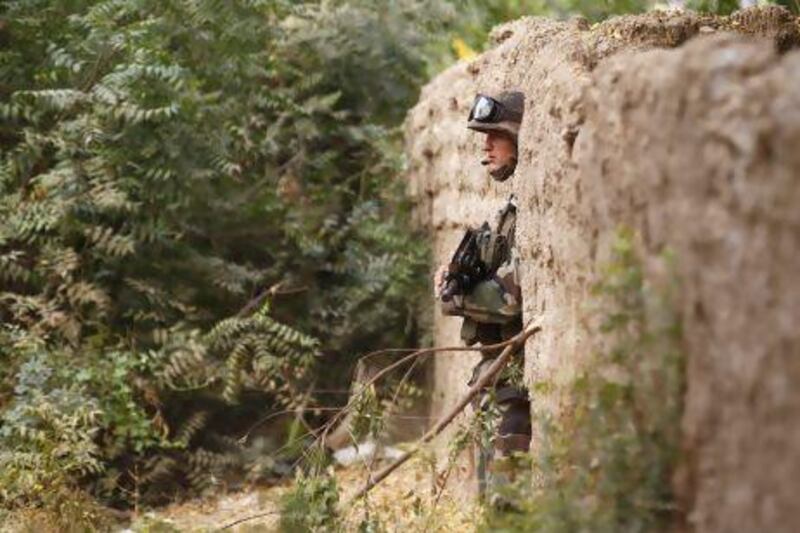DIABALY // It was not easy to seize back this small town in central Mali from the rebels who stormed it last week.
French fighters strafed it for days before Malian and French troops finally rolled in on Monday, hoping that the mishmash of armed Islamists and Tuareg rebels who had surged south to overrun Diabaly had gone.
But far tougher battles may lie ahead as French officials insist that it must be African soldiers who take the lead in the push toward the country's northern area held by rebels for more than nine months.
Questions loom over whether the Malian army, in particular, has the training, equipment and, crucially, popular support to go it alone.
With increased deployment of ground forces - more than 2,000 - and equipment, France has demonstrated that it is serious about its aim of retaking the north of Mali from the three militant groups - Ansar Eddine, Al Qaeda in the Islamic Maghreb and the Movement for Unity and Jihad in West Africa - and their allies who violently imposed Sharia there last year.
As many as 4,000 soldiers from France, Mali and other African countries could be needed for the mission, and donations are being solicited at an African Union conference later this month for a year of operations. But the message has been clear: French spokesmen on the ground have insisted their role is to support Malian troops, and French officials have said that it must be an African force in the lead.
On the ground in this tribally, ethnically and religiously diverse country, where the military have had a mixed record on loyalty and human rights, complications are already evident.
There were chickens pecking round the feet of Abdullahi Dagnon, the acting chief of Diabaly, as he explained that there was a small number of very devout Muslims in the town whom he thinks would be sympathetic to rebel forces.
These people, whom he referred to as followers of the Dawa ideology and as Wahhabists, welcomed the militants, he said, and approved of their form of Islam. "They are not a lot," he said, "but they are very devoted and courageous."
Dawa preachers - Dawa means "call" and the practice involves evangelism - travel from house to house teaching Islamic scripture and sleep in the mosques. Most are from outside the town, he said, but anyone was free to join them.
Such people, he said, are not fond of the army. "Maybe they think they are better Muslims," he said, but there may be a more direct reason.
In September last year, 16 men, said to be Mauritanian Dawa preachers, were gunned down at a checkpoint in Diabaly, where there is an army base, after their vehicle failed to stop at a checkpoint. Mauritanian officials were furious and the incident is infamous locally.
Mr Dagnon called the incident regrettable and said that there were rumours in the town that the militants' seizing of the the town last week was "a kind of revenge" for the incident.
Moussa Keita, the imam of a Diabaly mosque that embraces a strict version of Islam, denied that he or any of his followers helped the rebels. "They said this because their trousers are short and our trousers are short, they have beards and we have beards," he said.
But soldiers said they believed that local people had given shelter to the rebels, and another local leader in nearby Niono reflected the deep suspicions of devout Muslims in an area.
"They are the same," said Demba Diarra, of the slain preachers and the fighters. They were both his enemies, he said.
The allied forces may also struggle to find support within the Tuareg ethnic group. Tuareg independence fighters, who have long called for their own state in northern Mali, where their population is concentrated, initially took advantage of a power vacuum following last year's military coup to storm the north.
They were then marginalised by Islamist extremist groups, but some Tuareg fight alongside the militants still, and there is profound mistrust of the group by many black Malians.
"Now that there is a problem, there is a war, the Islamists are fighting the locals and the locals are pointing fingers at the Tuaregs," said Adama Coulibaly, a resident of Dongolé village near Niono with a Tuareg civilian population.
"The Islamists and the Tuareg rebels are the same," he said, adding, "I don't trust them." The Tuareg civilian residents of his village were in hiding, he said.
Once again, the problem seems likely to be compounded by army brutality. Human Rights Watch reported this week that it had received credible reports that Malian soldiers had recently killed Tuareg civilians and defected Tuareg soldiers.
In Diabaly, which has now become a town of soldiers - patrolling streets, mending jeeps and lounging - Mamadou Konné, a soldier from the south, said he was optimistic about the war. But when asked if he trusted the Tuaregs, his answer was simple: "You cannot trust someone who is fighting you."
twitter: For breaking news from the Gulf, the Middle East and around the globe follow The National World. Follow us





